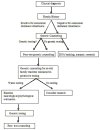New approaches to genetic counseling and testing for Alzheimer's disease and frontotemporal degeneration
- PMID: 22773362
- PMCID: PMC3437002
- DOI: 10.1007/s11910-012-0296-1
New approaches to genetic counseling and testing for Alzheimer's disease and frontotemporal degeneration
Abstract
The discovery of new autosomal dominant and susceptibility genes for Alzheimer's disease (AD) and frontotemporal degeneration (FTD) is revealing important new information about the neurodegenerative process and the risk for acquiring these diseases. It is becoming increasingly clear that both the mechanisms that drive these diseases and their phenotypes overlap. New technologies will assist access to genetic testing but may increase difficulty with genetic test interpretation. Thus, the process of genetic counseling and testing for these diseases is becoming more complex. This article will review current knowledge on the genetics of AD and FTD and suggest clinical guidelines for helping families to navigate through these complexities. The implications of future discoveries will be offered.
Conflict of interest statement
No potential conflicts of interest relevant to this article were reported.
Figures

References
-
- Gatz M, Reynolds CA, Fratiglioni L, et al. Role of genes and environments for explaining Alzheimer disease. Arch Gen Psychiatry. 2006;63:168–174. - PubMed
-
- Roses AD. On the metabolism of apolipoprotein E and the Alzheimer diseases. Exp Neurol. 1995;132:149–156. - PubMed
-
- Brickell KL, Steinbart EJ, Rumbaugh M, et al. Early-onset Alzheimer disease in families with late-onset Alzheimer disease: a potential important subtype of familial Alzheimer disease. Arch Neurol. 2006;63:1307–1311. - PubMed
Publication types
MeSH terms
Grants and funding
LinkOut - more resources
Full Text Sources
Medical

